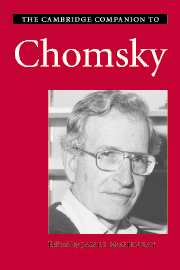Book contents
- Frontmatter
- Introduction
- Part I Chomsky on the human language
- 1 Chomsky’s science of language
- 2 Plato’s Problem, UG, and the language organ
- 3 Grammar, levels, and biology
- 4 How the brain begets language
- 5 Chomsky and Halle’s revolution in phonology
- 6 Universal aspects of word learning
- Part II Chomsky on the human mind
- Part III Chomsky on values and politics
- Notes
- References
- Index
6 - Universal aspects of word learning
from Part I - Chomsky on the human language
Published online by Cambridge University Press: 28 May 2007
- Frontmatter
- Introduction
- Part I Chomsky on the human language
- 1 Chomsky’s science of language
- 2 Plato’s Problem, UG, and the language organ
- 3 Grammar, levels, and biology
- 4 How the brain begets language
- 5 Chomsky and Halle’s revolution in phonology
- 6 Universal aspects of word learning
- Part II Chomsky on the human mind
- Part III Chomsky on values and politics
- Notes
- References
- Index
Summary
Suppose instead of saying Dutch we had said Clashes with the wallpaper; I thought you liked abstract work, Never saw it before, Tilted, Hanging too low, Beautiful, Hideous, Remember our camping trip last summer?
(Chomsky 1959; Review of B. F. Skinner’s Verbal Learning)Most of the action in linguistic theory under Chomsky’s aegis has focused on questions of how words are put together into sentences rather than on the words themselves. Fair enough: the universal hallmark of human language is its parametrically organized combinatorial structure. In linguistic systems, the individual word classes (for instance, the nouns, the verbs, the complementizers) play particular and crucial structural roles; rules and parameters directly implicate these classes. But what about the items that comprise these classes? It has been widely maintained that these individual atoms or particles of language play no central role in its core, or, to use recent terminology, in “language narrowly conceived” (Hauser, Chomsky & Fitch 2002). No distributional property of English worth its salt is dependent on whether some particular noun - let us say elephant rather than rhinoceros or gnu - appears in it. Rather, what words seem to be relevant to is the conceptual system that interfaces with language. In this latter domain, relevant to “language broadly conceived,” the difference between an elephant and a gnu really matters.
Similarly, the linguistic-theoretical study of language acquisition has focused primarily on the nature and setting of syntactic parameters rather than on the evolving character of the lexicon (e.g. Manzini & Wexler; 1987; Lightfoot 1999; Baker 2001). Again, this is no surprise. Acquisition of the combinatorial features of a language poses a classical poverty-of-the-stimulus problem, requiring the learner to extract abstract organizing principles from input structured only (or almost only) as morpheme sequences (see, particularly, Chomsky 1986).
- Type
- Chapter
- Information
- The Cambridge Companion to Chomsky , pp. 123 - 142Publisher: Cambridge University PressPrint publication year: 2005
- 15
- Cited by



